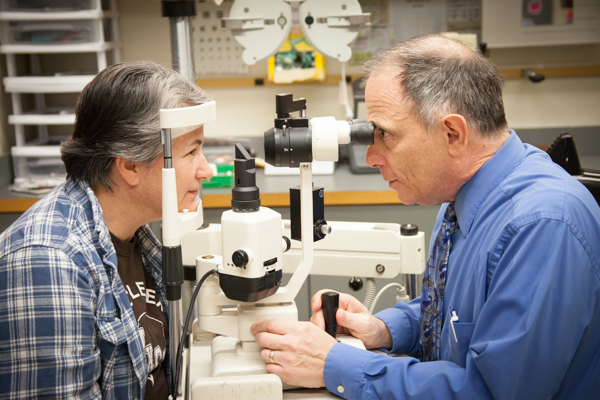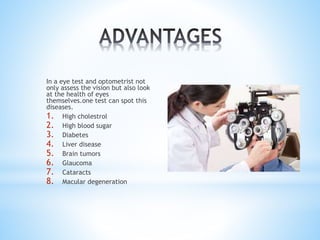Professional Glaucoma Service Near Me: Advanced Therapy Options
Wiki Article
Recognizing the Numerous Eye Issues Dealt With by Specialized Eye Care Professionals
In the realm of eye treatment, specialized professionals play an essential role in identifying and dealing with a large selection of eye conditions. As we begin on this exploration of the different eye problems resolved by specialized eye treatment specialists, it comes to be obvious that the complex web of eye health and wellness holds a myriad of interesting insights waiting to be uncovered.Typical Refractive Errors
Refractive mistakes are usual visual conditions created by an imperfection in the eye's ability to properly focus light, causing obscured vision. One of the most prevalent sorts of refractive errors include nearsightedness (nearsightedness), hyperopia (farsightedness), astigmatism, and presbyopia. Myopia takes place when the eyeball is also long or the cornea is also curved, creating far-off items to appear blurred. Hyperopia, on the various other hand, happens when the eyeball is also brief or the cornea is too level, resulting in close-by objects being out of emphasis. Astigmatism is defined by an irregularly designed cornea, resulting in altered or obscured vision at all ranges. Presbyopia is an age-related condition where the lens sheds its flexibility, making it challenging to concentrate on close items.These refractive errors can be corrected via various approaches, including eyeglasses, get in touch with lenses, or refractive surgery. Eye treatment specialists play a vital role in detecting and handling refractive mistakes to help individuals achieve more clear vision and improve their lifestyle.
Age-Related Eye Problems
As individuals age, their eyes might be at risk to a variety of conditions beyond refractive mistakes that can impact their vision and general ocular wellness. Age-related eye conditions prevail and can significantly impact the quality of life for older grownups. One of the most common age-related eye conditions is age-related macular degeneration (AMD), a condition that creates central vision loss and can make tasks like analysis and driving challenging. refractive surgeries in al. Cataracts, another usual condition among older individuals, cause clouding of the eye's natural lens, leading to blurred vision. Glaucoma, defined by damages to the optic nerve, is additionally extra widespread with age and can result in field of vision loss or blindness if left neglected. Furthermore, presbyopia, a condition where the eye's lens sheds versatility, is a natural component of aging and leads to difficulty concentrating on close items. Routine eye exams with specialized eye treatment specialists are crucial for early discovery and monitoring of these age-related eye conditions to preserve vision and keep eye health as people get older.Vision-Threatening Illness
Vision-threatening illness incorporate a range of significant ocular conditions that have the prospective to significantly affect a person's eyesight and overall aesthetic feature. These diseases posture a danger of permanent vision loss otherwise immediately diagnosed and dealt with by specialized eye treatment experts. Some usual vision-threatening illness include glaucoma, diabetic retinopathy, age-related macular deterioration (AMD), and retinal detachment.Glaucoma is a team of eye problems that harm the optic nerve, usually due to high intraocular stress, leading to outer vision loss and prospective loss of sight if left neglected. AMD is a progressive condition impacting the macula, leading to central vision loss.
Very early detection, routine eye exams, and prompt treatment are vital in handling vision-threatening diseases to protect eyesight and keep high quality of life. Specialized refractive surgeries in al eye care specialists play an important duty in diagnosing, treating, and taking care of these conditions to avoid irreversible vision loss.

Corneal Problems
Corneal conditions encompass a spectrum of conditions that impact the clear front component of the eye, referred to as the cornea. These disorders can result in pain, aesthetic disturbances, and in severe instances, vision loss. One common corneal condition is keratoconus, where the cornea thins and bulges outward into a cone form, triggering astigmatism and obscured vision. Corneal dystrophies, such as Fuchs' dystrophy, cause progressive vision loss as a result of uncommon deposits in the cornea. Corneal abrasions, often brought on by injury or foreign items, can bring about discomfort, soreness, and level of sensitivity to light. Furthermore, infections like keratitis can irritate the cornea, potentially leading to scarring and vision disability if not promptly treated. Therapy for corneal conditions differs depending on the details problem yet might consist of drugs, contact lenses, or in serious instances, corneal transplants. Routine eye exams are crucial for very early detection and monitoring of corneal conditions to maintain vision and eye wellness.Neurological Eye Problems
Neurological eye conditions involve problems that influence the link between the eyes and the mind, affecting aesthetic handling and general eye feature. These problems can show up in various methods, affecting vision, eye activities, and also the coordination between the eyes. One typical neurological eye problem is optic neuritis, identified by swelling of the optic nerve causing vision loss, color desaturation, and pain with eye movement.An additional considerable condition is nystagmus, where the eyes make recurring, unrestrained activities, impacting aesthetic acuity and deepness perception. In addition, conditions like amblyopia, frequently described as "careless eye," arise from uncommon aesthetic advancement in very early childhood years, bring about minimized vision in one eye.
Neurological eye problems require customized treatment from specialists like neuro-ophthalmologists that have competence in both neurology and ophthalmology. Diagnosis typically includes a comprehensive eye exam, imaging researches, and collaboration with specialists to address the underlying neurological concerns affecting the visual system. Treatment strategies can consist of medication, vision therapy, or in serious instances, medical treatments to take care of these complex conditions successfully.

Conclusion
Finally, specialized eye care specialists deal with a large range of eye problems, consisting of usual refractive errors, age-related eye problems, vision-threatening illness, corneal conditions, and neurological eye conditions - refractive surgeries in al. By understanding these numerous problems and seeking suitable treatment from eye treatment specialists, people can preserve optimum eye health and wellness and vision. It is essential to focus on normal eye evaluations and follow suggested treatment strategies to maintain and secure one's vision for the futureReport this wiki page